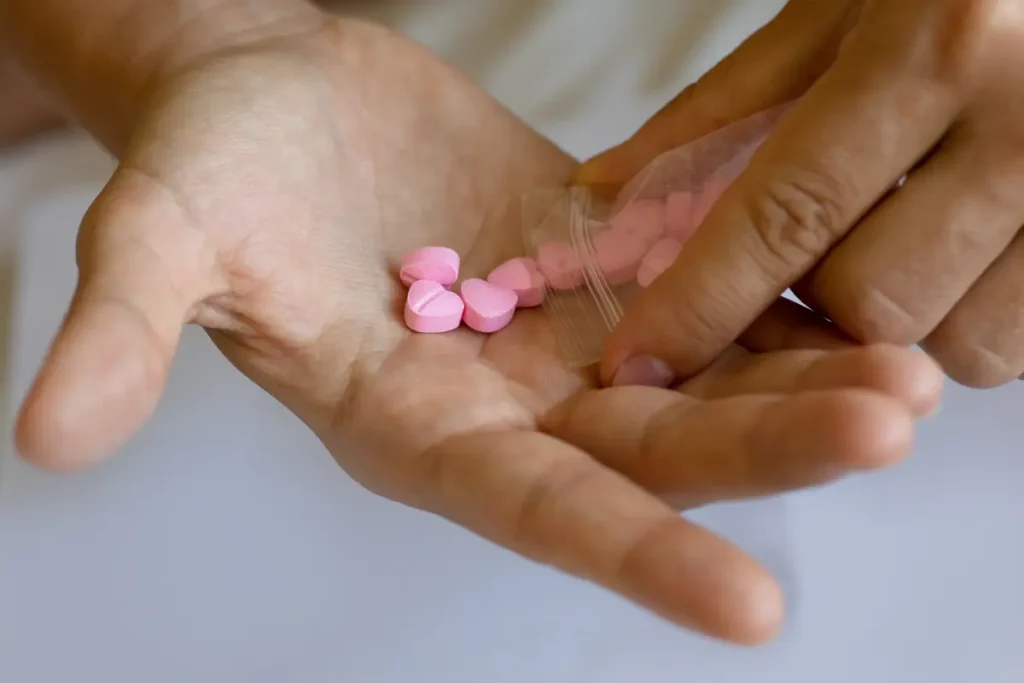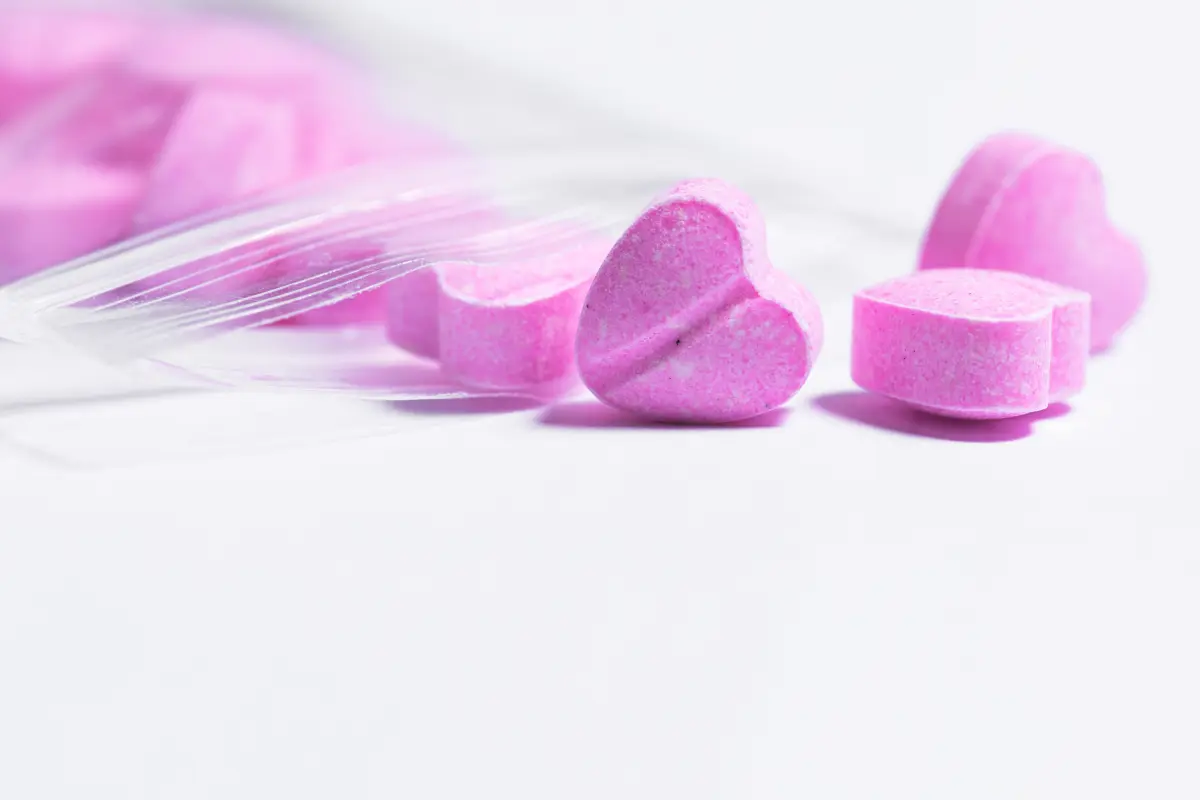We offer medical detox and multiple addiction treatment options in our
luxury treatment centres in Port Hope, Cobourg, and Ottawa.
Molly (MDMA) Addiction Guide: Is Molly Addictive?
Molly is a slang name for 3,4-methylenedioxy-methamphetamine (MDMA), also known as ecstasy. It is a synthetic drug developed over a century ago and was first used in the 1970s to enhance psychotherapy and treat disorders like PTSD. However, MDMA is classified as a Schedule-I Drug under the Canadian Controlled Drugs and Substances Act, meaning that it has no currently accepted medical use.
Molly is the crystalline form of MDMA, a stimulant and hallucinogen that produces euphoric feelings of energy, alertness, confidence, emotional warmth, and empathy. The drug also causes a change in mood and distorts one’s perception. It is available as a pill, liquid or powder. Molly is marketed as the pure form of MDMA or ecstasy, but most Molly sold is mixed with other substances like bath salts, cocaine, and ketamine to increase its potency and reduce manufacturing costs. Some may not contain any MDMA at all, and using these illegal substances may put one at risk of severe health complications and possible death.
Today, Molly has become a popular street drug for people who use it at clubs, raves, music festivals, and all-night parties. The drug is often presented as a harmless way to have fun, but is Molly addictive, and can you get addicted to Molly? CCFA’s guide explains all you need to know about Molly addiction.
Key Takeaways
- Molly is a slang name for illegally manufactured and sold MDMA or ecstasy
- The drug is often thought to be a purer form of MDMA and ecstasy, but most illegal MDMA is laced with other substances
- Molly can cause dependence and addiction due to its actions on the brain’s reward centers
- Long-term Molly users may experience withdrawal symptoms when they cease or reduce their use of the drug.
Why Can Molly Be Addictive

Whether Molly is addictive or not remains a subject of debate, as not everyone coming off the drug manifests symptoms of addiction. The fact that most of what is sold as Molly is mixed with other substances also makes it difficult to tell whether a person is addicted to the drug or a mixture of substances.
People who use Molly for a prolonged period tend to display signs of dependence. This means that they develop tolerance and withdrawal from the drug. Individuals who abuse and develop a compulsive need to use Molly may be diagnosed with a substance use disorder.
Some research proves that chronic MDMA use can cause physical dependence on the drug. Regardless, others suggest that prolonged use of the drug is not linked to dependence.
Molly is potentially addictive due to its mechanism of action. It activates dopamine, serotonin, and norepinephrine receptors in the brain. Dopamine regulates pleasure and motivation, while norepinephrine increases heart rate and blood pressure. Serotonin regulates appetite, mood, and sleep and influences hormones responsible for arousal and trust.
Molly increases the activities of these neurotransmitters, producing the associated euphoric sensations. By causing the brain to release large amounts of these chemicals, Molly causes neurotransmitter depletion responsible for the “crash” experienced after the euphoria wears off. The desire to avoid the effects of this crash may cause a person to use more Molly, potentially commencing a cycle of addiction.
If you think you or a loved one is struggling with Molly addiction, it’s crucial to seek help immediately. The Canadian Centre for Addictions offers multiple sophisticated drug abuse and addiction treatment. Our team of addiction experts is always ready to assess your situation and guide you towards lasting recovery.
Causes of Molly Addiction
Molly addiction describes a compulsive need to use the drug despite obvious adverse consequences. There is no single reason why a person might develop an addiction to Molly, but factors that may trigger Molly addiction include:
Genetic Factors
A person’s genetic composition and family history play a role in their drug overuse and becoming addicted to substances. Individuals from homes where a loved one has struggled with substance abuse may also be more likely to develop an addiction.
Peer Pressure
Teenagers and young adults represent the highest group of Molly users. The need to conform and not feel left out, especially in social situations, can lead young people with low self-esteem to abuse and become addicted to drugs like Molly.
Past History of Trauma
Molly has hallucinogenic effects, which can provide a sense of escape from negative experiences. Individuals with a history of traumatic experiences may abuse and become addicted to Molly as they use the drug to feel better.
History of Drug Abuse
Individuals with a previous history of abusing other substances like alcohol, marijuana, and prescription pills may be more likely to abuse Molly.
Existing Mental Health Conditions
Individuals with existing health conditions like depression or PTSD may attempt to self-medicate and develop an addiction to drugs like Molly.
Signs and Symptoms of Molly Addiction
The signs and symptoms that a person may be struggling with Molly addiction include:
- Difficulty Controlling Molly Use
A person addicted to Molly will struggle to control their drug use. So, they will try and fail to stop using the drug and feel guilty whenever they succumb to their cravings. They may also spend significant time and resources trying to obtain and use the drug. Molly use may also take priority in their lives over their relationships, family, and other interests.
- Experiencing Intense Cravings for Molly
Individuals with Molly addiction will feel regular cravings to use the drug. The action of Molly on dopamine and serotonin transmitters causes the brain to get used to the artificial stimulation the drug offers. This results in intense cravings for the drugs whenever the effects wear off.
- Neglecting Responsibilities Due to Molly Use
Individuals addicted to Molly will neglect their work, academics, and other responsibilities if it helps them to get the drug. You may observe diminished productivity at work or lower grades in someone who is dealing with Molly addiction.
- Excessive Perspiration in Social Situations
The stimulant actions of Molly on the nervous system cause users to overheat and sweat profusely, especially when in social gatherings like clubs or parties. A typically sedate person who suddenly becomes overactive and begins to sweat profusely may be dependent or addicted to Molly.
- Exhibiting Occasional Signs of Psychiatric or Cognitive Disorders
Molly’s hallucinogenic properties can cause psychiatric or cognitive disorders in chronic users. People who abuse or are addicted to Molly may experience memory loss, confusion, and hallucinations due to the massive neurotransmitter fluctuation from repeated Molly use. Some of these issues may become permanent without professional drug abuse or addiction treatment.
- Developing Tolerance to Molly
Individuals addicted to Molly will need increasing amounts of the drug to get the same euphoric effects. Continued use may also lead to dependence in some people, a situation where they become functionally impaired without the drug.
- Alternating Between Hyperactivity and Depression
Molly causes increased energy levels and heightened sociability and the opposite feelings of irritability and depression when the effects wear off. Someone addicted to Molly will frequently alternate between excitement and depression whenever they use the drug.
How to Tell If Someone Is Addicted to Molly
A person addicted to Molly likely will exhibit physical and psychological symptoms, including:
Physical Effects
- Dehydration
- Clenched teeth or jaws
- Excessive sweating
- Dehydration
- Dilated pupils
- Headaches
- Diminished appetite
- Nausea and vomiting
- Tense muscles
Psychological Effects
- Emotional warmth
- An improved sense of well-being
- Mild confusion
- Increased empathy
- Talkativeness
- Restlessness/excitability
- A desire for physical contact
Molly Withdrawal

Molly withdrawal refers to the adverse effects that come after the euphoric effects wear off. Prolonged Molly use causes the brain to become dependent on the drug to function. During withdrawal, the brain tries to adjust to functioning without the drug, leading to unpleasant withdrawal effects. Withdrawal starts a few days after the last use and may last weeks to months. The intensity and duration of Molly withdrawal depend on the following:
- The frequency and duration of drug use
- Metabolism and overall health status
- Age
- Purity of the drug used
- Genetic factors
- Tolerance
- Gender
- Use of other drugs
- Presence or pre-existing mental health disorders
Molly primarily causes psychological withdrawal symptoms, including:
- Cravings for the drug
- Depression
- Anxiety and panic attacks
- Sleep disturbances
- Fatigue
- Changes in self-perception
- Memory problems
- Difficulty concentrating
- Loss of appetite
Some symptoms can be intense and cause the user to seek out the drug again, leading to relapse and perpetuating the cycle of drug abuse and addiction. Many people undergoing withdrawal will require medical detox and rehab to achieve and maintain sobriety.
Molly Abuse and Addiction Treatment
Molly is often laced with other substances, and it can be difficult to tell whether a person is addicted to the drug alone. In fact, the answer to the question, “Is ecstasy addictive?” remains unclear. However, the drug’s stimulant properties are similar to those of narcotics like cocaine, even though it may not be so potent.
The risk of addiction varies among users, but the drug carries a real potential for dependence, meaning that heavy users crave the drug and experience adverse withdrawal effects when they stop using the drug.
Since someone addicted to Molly is also likely to be abusing other substances, it’s crucial to seek the help of a professional. Treatment of Molly addiction involves medical detox and withdrawal symptom management to reduce drug cravings and prevent relapse.MDMA (Molly) or ecstasy addiction treatment will involve inpatient or outpatient rehab and specific therapies to help them become and remain sober. Depending on the specific circumstances, the individual may also require support and aftercare services to maintain their sobriety.
When to Consult a Medical Professional
Molly is an illegal drug, and all use is potentially hazardous to your health and well-being. One may be able to get away with occasional Molly use, but you should consult a medical professional about your use of Molly if you notice the following:
- Trying and failing to stop using Molly
- Using Molly in steadily increasing amounts than intended
- Experiencing intense cravings for Molly
- Spending a great deal of time obtaining and recovering from the effects of Molly
- Continued Molly use despite its physical and psychological health consequences
- Using Molly even when it’s affecting your work, school, or other activities
- Giving up important activities or activities you once enjoyed to use Molly
- Using Molly when it’s affecting your relationship with friends and loved ones
- Engaging in risky activities like driving, having unprotected sex when under the influence of Molly
- Experiencing withdrawal symptoms when you reduce or cease using Molly
- Overdosing on Molly.
Conclusion
The debate about the addictive potential of the drug Molly is still the subject of research, but clearly, some heavy users can develop dependence and addiction. Molly addiction is a serious issue that requires professional help to overcome. It’s crucial to seek help if you’re unsure of the substances combined with the Molly you use.
Fortunately, the Canadian Centre for Addictions offers Molly, MDMA, or ecstasy addiction treatment. CCFA helps people understand their addictions and the healthier coping strategies available by engaging them in one-on-one counselling with certified counsellors, psychiatrists, and mental health professionals. Call us today at 1-855-499-9446, and someone will speak to you about Molly abuse and addiction.
FAQ
Can you overdose on Molly?
Yes. It is possible to overdose on Molly. A case of Molly overdose can cause dehydration, seizures, hyperthermia (extremely high body temperature), organ failure, and death even after the first use. It’s vital to call for emergency help immediately if you think someone has overdosed on Molly.
What is the addiction rate for Molly?
The addiction rate for Molly is not well-established due to limited research on the subject. However, available research indicates that less than 1% of Canadians aged 15 and older reported using the drug in the year 2016.
What are the side effects of Molly use?
The side effects of Molly use depend on individual factors like the amount taken, the purity of the drug, and the overall health of the individual. Some common side effects include:
● Hyperthermia (extremely high body temperature)
● Increased heart rate and blood pressure
● Anxiety and confusion
● Nausea and vomiting
● Loss of consciousness
● Sleep problems
● Hallucinations
● Seizures
● Personality and mood changes
● Dizziness and blurred vision
How does Molly use affect the brain?
Molly affects the brain by activating the brain’s reward centers. When you take Molly, it triggers the release of dopamine, serotonin, and norepinephrine, resulting in euphoric feelings of energy and excitement. These feelings dissipate as the drug wears off and can leave you feeling irritable and depressed. Repeated use of Molly has the potential to disrupt normal brain functioning, leading to problems with mood, memory, and concentration.
What are the legal implications of Molly use?
Molly is classified under the Canadian Controlled Drugs and Substances Act as a Schedule I drug. Possession of the drug is illegal and can lead to a fine or imprisonment depending on specific factors like the amount of the drug or intent to distribute. However, MDMA use may be used legally in cases where a Special Access Program request is granted.






